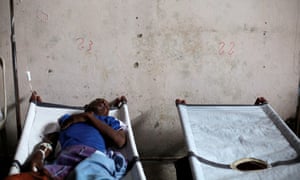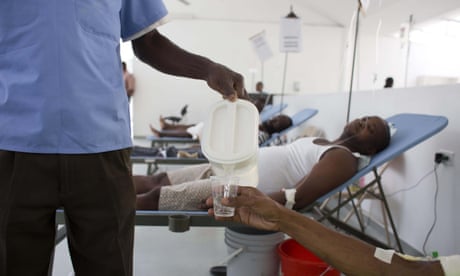Letter discussed United Nations’ ‘human rights obligation’ amid deadly outbreak brought into Haiti by peacekeepers

Ed Pilkington in New York
The United Nations is showing the first signs of compromise over the Haiti cholera epidemic, after more than five years in which it has consistently refused to accept responsibility for a disaster that has claimed tens of thousands of lives.
Groups working with Haitian victims have greeted the apparent shift in the UN’s position as a potential breakthrough in a crisis that has devastated one of the poorest countries in the world and sapped the credibility of the very organization that was supposed to be helping it.
The deadly bacterium was imported into the country in 2010 by infected UN peacekeepers who dumped contaminated sewerage directly into local rivers. Latest studies suggest that at least 30,000 people have died, with more than two million survivors of the illness.
The UN’s olive branch comes in a letter from its second-in-command, Jan Eliasson, in response to sharp criticisms leveled against the UN leadership by the organization’s own human rights experts. Five UN special rapporteurs on human rights wrote to secretary-general Ban Ki-moon in March warning him that his dogged refusal to accept the UN’s role in bringing cholera to Haiti was undermining the world body’s reputation.
In his letter, Eliasson replies: “The secretary-general and I are fully committed to ensuring that the organization fulfills its human rights obligations.” Though he does not mention the vexed question of responsibility for the catastrophe, he does say he is willing to “engage further” in discussing ways in which the UN could do more to “assist the victims of cholera and their communities”.
He even holds out the vague, though significant, promise that resources “could be fine-tuned or expanded as needed”.
Beatrice Lindstrom, a staff attorney with the Institute for Justice and Democracy in Haiti (IJDH) which works with Haitian cholera victims, said that “this looks like a potential breakthrough. For five years the UN has refused to engage at any level on this, but now for the first time they are acknowledging that they have human rights obligations and are ready to sit down and talk”.
The letter suggests a dramatic change in tack by Ban. The top official’s position until now has been that the world body is protected by immunity from claims against it, even though the UN’s own treaties stipulate that “compensation commissions” should be set up to provide redress to individuals harmed by the UN’s actions.
A factor behind the new approach of Ban and his inner team may be the federal lawsuit brought on behalf of Haitian cholera victims that is currently being considered by the federal second circuit appeals court in New York. The legal action presents overwhelming scientific evidence that the cholera bacterium was brought to Haiti in October 2010 by UN peacekeepers who were relocated from an area of Nepal where the disease is endemic.
No effort was made to screen the incoming peacekeepers or to vaccinate them prophylactically to guard against spreading the deadly illness. A leaked report by the UN’s own investigators based on research carried out a month after the outbreak found an astonishing failure to ensure even basic hygiene standards at the peacekeepers’ camp at Mirebalais.
Lindstrom, who is lead attorney on the lawsuit, said that despite the conciliatory note of Eliasson’s letter the onus still lay on the UN to set things right. “This presents a test of leadership to Ban Ki-moon months before he steps down – he needs to act quickly to open up a dialogue with experts on how justice can be achieved here.”
In an annex to the Eliasson letter, the UN sets out the varied ways it claims to be striving to contain the ongoing epidemic that continues to kill scores of Haitians every month. It says medicines have been supplied to diarrhea treatment centers, sanitary systems built and a vaccination program started for up to 100,000 people.
Joia Mukherjee, chief medical officer of Partners in Health which has operated in Haiti for 30 years, was scathing about the UN’s role in tackling an epidemic it inadvertently triggered. “The UN has not been involved in providing funds or medicines to treat the sick,” she said.
“The UN has not been involved in setting up special medical tents for cholera patients. What has the UN done to provide water and sanitation infrastructure? Nothing.”
She went on: “Yes, the UN has done some education campaigns teaching people how to wash their hands. But that is wildly insufficient – it’s laughable – compared with the scale of the epidemic.”
